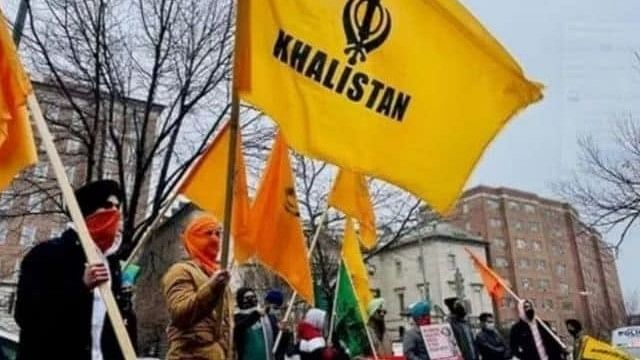
Representative image of Khalistan flags.
Credit: PTI Photo
Canada has a long history of flirting with secessionists seeking a Khalistan carved out of India. The idea of a separate homeland for the Sikhs sprouted in the West more than 50 years back when Jagjit Singh Chouhan, a dental surgeon by profession, put out an advertisement in the New York Times in 1971 proclaiming the birth of Khalistan with him being its self-styled president. The idea gradually spread to Canada, Australia, the United States, the United Kingdom and other countries. Canada patronized such elements, and the country quickly became a safe haven for the Sikh Khalistani radicals who continued their campaign against India with impunity.
Ottawa’s inability or lack of political will to act against Khalistani protagonists remained evident all through. The latest Canadian census states Sikhs account for 2.1 per cent of Canada’s population and the country is home to the largest population of Sikhs in the world after India. Sikhs hold prominent positions in the Canadian power apparatus and many of them are lawmakers, which is why this populace assumes an important political constituency in Canada.
The Khalistan narrative has ebbed in Punjab, yet it continues to resonate ever more viciously in Canada. The numbers of the extremists and their supporters in Canada may not appear threatening, but what makes them heard is their loud posturing and demeanour. It may assume a significant proportion if left unbridled. India’s concerns are not unfounded as is evident from various instances where Canada wouldn’t go beyond lip service.
The Sikhs for Justice (SFJ), a Khalistani separatist outfit banned in India, in the past called for the ‘Balkanisation of India’ and even asked Hindus to leave Canada. It also organised a referendum to garner support for Khalistan in several cities in Canada.
The extremists recently circulated flyers with photographs of the High Commissioner of India to Canada and other diplomats, threatening violence against them. They accused the diplomats of playing a role in the killing of Khalistani leader Hardeep Singh Nijjar in Canada. Brampton saw a parade on June 4 where a tableau celebrated the assassination of Indira Gandhi, with the poster saying: “Revenge for the attack on Darbar Sahib”. Several Hindu temples have been vandalized in Canada by the Sikh radicals. A 20-foot-tall bronze statue of Mahatma Gandhi in Canada was also vandalised in July last year. . In the United Kingdom (UK) too, violent protests by Khalistan extremists outside the Indian High Commission (HC) were witnessed in March 2023.
The attempts to amplify the anti-India sentiments in Canada have grown in recent years. The Khalistani ideologues have a sizable command and control over many Gurdwaras in Canada. Congregations by the community are often overshadowed by a radical narrative. The majority of the Sikhs in Canada do not support the Khalistani campaign but remain silent fearing intimidation. The absence of a counter narrative too adds to the complexity of the matter. Canada sees its political interest given that in Toronto, Surrey, Vancouver, Brampton and certain other pockets, the Khalistani supporters have a defining impact on the Sikh votes. In 2017, Jagmeet Singh, 39, became the first Sikh leader of a prominent Canadian political party when he took charge of the New Democratic Party (NDP).
Pyara Lal Garg, a well-known political and social activist in Punjab, said if a sovereign power raises such serious allegations as Canada did against India, it is incumbent upon both nations to probe it. Any kind of shadowboxing between a country as huge as India and a NATO member country will only help inflame passions on all sides. There is no Hindu-Sikh divide in India, and the talks of such a divide in Canada are only aimed at serving vested interests,” he said, referring to Khalistani extremists’ threat to Canadian Hindus.
(The writer is a journalist based in Chandigarh)